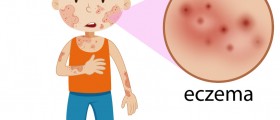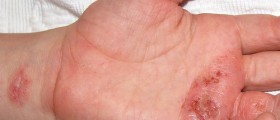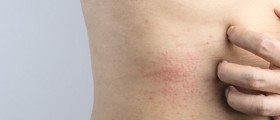
Hand eczema is a skin condition affecting only hands although it may also spread to the rest of arms or even other parts of the body. Eczema affecting only the hands is reported in approximately 10 % of all population. It develops as a consequence of many factors some of which are internal (e.g. genetics) while others are external (e.g. a contact with irritants). The condition is frequently reported in people whose work involves cleaning, catering, hairdressing and all the jobs that include prolonged and repeated exposure to certain chemicals which may be irritating to the skin.
Types of Hand Eczema
Hand eczema may occur in a form of irritant contact eczema, allergic contact eczema and atopic eczema.
Irritant contact eczema results from exposure to different chemicals which all can cause irritation of unprotected skin. Such eczema typically affects the back of the hands and is most commonly considered a professional diseases because it occurs in people who are on a daily bases exposed to certain chemicals. If the condition is severe enough, a person may even need to give up work and change job in order to bring the skin inflammation under control.
Allergic contact eczema is associated with hypersensitivity of a person and abnormal reaction of the immune system once the body (in this case the hands) get exposed to a specific allergen. This type of eczema affects people with a genetic predisposition.
Finally, there is atopic eczema, a skin condition characterized by a genetic and hereditary tendency. This type of eczema affects people who are also prone to other allergic conditions such as asthma.
Eczema on Hands Clinical Characteristics
In the majority of cases only fingers are affected although skin irritation may spread further to the back of the hands or the palms. The affected skin is in the beginning itchy. What follows is reddening of certain parts of the hand. The skin can also be dry and sometimes even covered with small fluid filled blisters. Cracks, skin swelling, pustules, crusting and pain are reported in more severe forms of skin inflammation.
Hand Eczema Treatment
Prior to opting for any treatment, doctors need to identify the underlying cause of hand eczema and classify the condition.
Irritant and allergic contact dermatitis symptoms and signs may be easily brought under control once the person stops being exposed to harmful chemicals and allergens. Hydration and integrity of the skin can be restored and maintained with moisturizers. Some patients also require steroid creams and ointments. These are used for a short period of time. Severe cases require topical immunosuppressants and one may also be recommended light therapy (PUVA).
















Your thoughts on this
Loading...